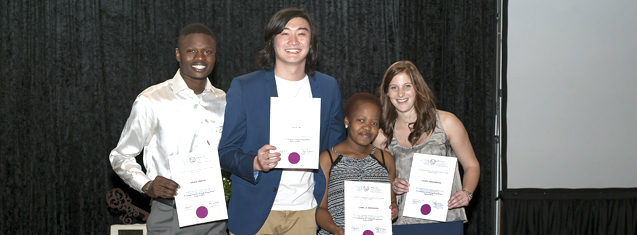Latest News Archive
Please select Category, Year, and then Month to display items
12 January 2024
|
Story Nonsindiswe Qwabe
|
Photo Sonia Small
 Since joining the UFS in 2008, Dr Grey Magaiza has worked extensively on approaches that can foster the socio-economic transformation of societies.
Since joining the UFS in 2008, Dr Grey Magaiza has worked extensively on approaches that can foster the socio-economic transformation of societies.
“The future should be one where communities can decide on their development agenda and futures. That’s the most important for me.” Dr Grey Magaiza, Deputy Director of the Centre for Gender and Africa Studies (CGAS) and Head of the Community Development programme on the Qwaqwa Campus, is passionate about capacitating communities to be agents of change and advancement. His vision for the future emphasises the empowerment of communities to take charge of their development by actively participating in decision making and the implementation of development projects that can improve their lives.
Since joining the UFS in 2008, Dr Magaiza has worked extensively on approaches that can foster the socio-economic transformation of societies. Over the years, he has crafted his research speciality into one that he is most proud of – being an interdisciplinary scientist immersed in the development of communities.
“I’m in a fortunate position of researching what I like. I say ‘fortunate’, because I’ve taken the time to understand what I’m passionate about, which is the overall field of rural livelihoods and livelihood futures – in short, community development. My research starts from an engaged university, understanding the elements that a university must use to enhance transformation and relevance to its immediate community in terms of development.”
One of the ways he has done this is by looking at social entrepreneurship as a development approach for young people in a rural setting. Through workshops with non-profit and civic organisations in Qwaqwa, Dr Magaiza has been helping these organisations to map out their needs and actively meet them through the involvement and support of external role players.
“We understand that communities are part of the national development agenda, but even that national agenda respects community knowledge and intentions and allows communities to shape their identity. A critical enabler of this is community organising. You bring back the capacity in communities to have dialogues on issues affecting them as spaces for engagement, knowledge exchange, and for people to just talk about their way forward.”
By enabling communities to define their development agenda, they can address their specific needs, challenges, and aspirations, he said. “When I look at livelihood futures, it’s quite an exciting aspect of my work – it’s like looking into a fortune tellers’ globe, because you’re not deciding for communities what they should do, but the communities themselves take those decisions.”
Leadership for Change celebrates graduation ceremony
2014-10-15

The Leadership for Change Programme hosted its third annual graduation ceremony on 9 October 2014 at the Centenary Complex on the Bloemfontein Campus.
The event consisted of two segments. The first was aimed at the group who has travelled abroad during the past year. They were presented with special certificates acknowledging the work they have done during their participation in the programme.
The second element of the evening was to wish the 2014/2015 group all of the best for their upcoming travels. This group will be travelling abroad during next year. Of the 250 applicants, the top 32 students were chosen to be part of the Leadership for Change Programme.
Prof Jonathan Jansen, Vice-Chancellor and Rector, said, “I hope you came back with the capacity to distinguish right from wrong – not only through law, but morally as a leader.”
Waldo Staude, Vice-president of the Student Representative Council (SRC), acted as Chair to the evening’s proceedings. He is also an alumnus of this programme.
“This programme has made its mark as we observe the number of leadership positions our students from the programme hold on this campus,” Staude said. “We have eight Leadership for Change students in the SRC for the 2014/15 term.”
The Leadership for Change Programme each year gives first-year students exposure to top universities throughout the world. Its focus is to establish a new campus culture of student relations across boundaries.
Six cohort groups – of between five to six students each – will visit universities on three different continents in January 2015. Each group will be accompanied by a UFS staff member serving the role of mentor.
The universities they will be visiting (according to continent), are:
USA
Cleveland State University
University of Minnesota
University of Vermont
Europe
The Netherlands: Vrije University in Amsterdam
Belgium: University of Antwerp and Ghent University
Asia
Japan: International Christian University